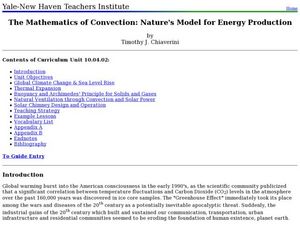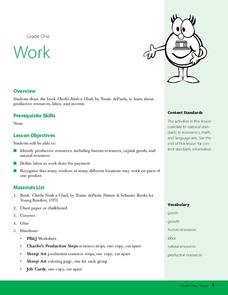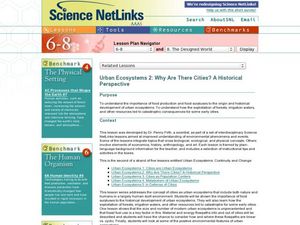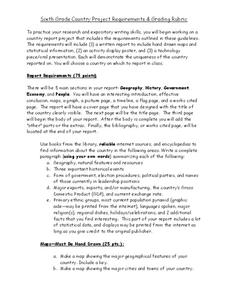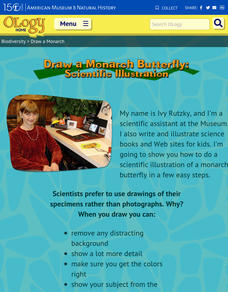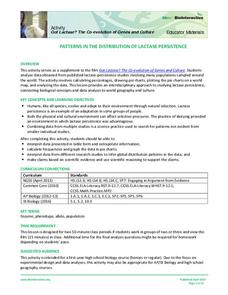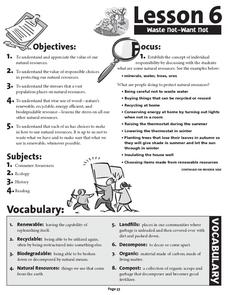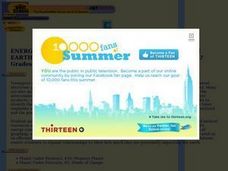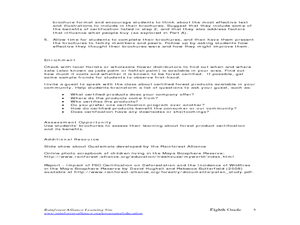Curated OER
The Mathematics of Convection: Nature's Model for Energy Production
High schoolers conduct a series of experiments to investigate density, buoyancy and climate. In this math lesson, pupils design and build a hot air balloon to demonstrate convection. They research and write a paper about solar chimneys.
Curated OER
Natural Resources and Transportation in the United States
Pupils study thematic maps (included with the lesson) to determine possible relationships. They develop three hypotheses about the relationship. Students choose one of their hypotheses to explain. The explanation is to include reasons...
Curated OER
Exploring Indiana's Natural Resources
Fourth graders complete a variety of activities as they study the European exploration of the Midwest, focusing on Indiana. They map the path explorers took, comparing the British with the French. They research why the explorers stopped...
Curated OER
Everyday Is Agriculture Day
Students examine the role of the modern farmer through an interactive CD. Once they identify the role of farmers, they create typical farm schedules using math skills. In this instructional activity about Alaska agricultural products,...
Curated OER
Work
Students identify productive resources. In this economics instructional activity, students read the book Charlie Needs a Cloak and discuss productive resources the character used in the book. Students participate in a simulated factory...
Kenan Fellows
Ready, Set, Save on Solar Energy Technology!
Does your class have a bright future in the solar energy industry? Science scholars take an in-depth look at what's new in solar technology. After completing research into the solar industry, participants create and market a product in...
Curated OER
Urban Ecosystems 2: Why Are There Cities? A Historical Perspective
Young scholars investigate the importance of food surpluses to the historical development of urban ecosystems.
Mesa Public Schools
Country Project
Give your young learners the chance to discover more about countries in their world community with a research project. Class members write reports on an assigned country and include such major features as geography, important historical...
American Museum of Natural History
Bio-Benefits
Kick-start a discussion of the importance of biodiversity with a colorful resource that touts the benefits of maintaining healthy ecosystems. The images stress the interdependence of all the elements of an ecosystem.
Beyond Benign
Daphnia Bioassay LD50
De-icing materials may have a harmful effect on our environment; have your class perform an experiment to test the nature of these effects. Scholars monitor the survival rate of a sample of daphnia as the concentration of a de-icing...
American Museum of Natural History
Draw a Monarch Butterfly: Scientific Illustrations
One doesn't have to be an artist to appreciate nature. A thorough resource shows pupils how to create detailed illustrations of a monarch butterfly. The lesson highlights the benefits of creating scientific drawings as opposed to simply...
Illustrative Mathematics
The Sign of Solutions
Positive or negative, zero or no solution, are all possibilities for the solution of a linear equation. Here the resource gives examples of linear equations in one variable and their type of solutions. The resource comes with commentary...
American Physiological Society
What Environmental Conditions Lead to the Hatching of Brine Shrimp?
Will changing the environment in which brine shrimp live impact their reproductive success? Young scientists get hands-on experience studying the habitat of brine shrimp in a two-week immersion lesson. The teacher's guide provides all of...
School District No. 43
Writing a Greek Myth
Ask your learners to dream up a myth set in modern day. These mythology writing prompts require individuals take on the role of an ancient Greek citizen who just woke up to a totally different world. Through this lens, class members...
Howard Hughes Medical Institute
Patterns in the Distribution of Lactase Persistence
We all drink milk as babies, so why can't we all drink it as adults? Examine the trend in lactase production on the world-wide scale as science scholars analyze and interpret data. Groups create pie charts from the data, place them on a...
Curated OER
Family Heirloom Cuckoo Clock
Students research the Black Forest region of Germany to assess its people, natural resources, products and crafts. They focus in on their production of cuckoo clocks. Each student designs and makes their own replica of a Black Forest...
Curated OER
What's the Earth Worth?
Students are able to identify natural resources from a shared reading by highlighting, scoring at least a 3 on a 4 point rubic. They describe in journal entries, after reading the book Amelia Bedelia Goes Camping or Curious Geogre Goes...
Curated OER
How To Make an Apple Pie And See the World
Students define and discuss global interdependence. They read How to Make an Apple Pie and See the World and keep a list of the countries visited during the story and identify all of the productive resources and natural resource...
Curated OER
Waste Not Want Not
Students are introduced to the need to save natural resources. Through inquiry, hands-on activities, and problem solving, students increase their understanding of solid waste materials and the need to reduce, recycle, and reuse.
Curated OER
Energy Eccentricity
Students assess their own energy use to help develop an awareness of the different types of natural resources affected by consumers. Their calculations show them how much they are personally impacting the Earth. Very meaningful and...
Curated OER
Get to Know Glass
Students learn about the properties of glass. In this making and molding glass lesson, students participate in an experiment where they will learn how glass is created and how it is shaped to create bottles and jars. Students also...
Curated OER
Tortilla Factory
Students identify productive resources and intermediate goods used to produce corn tortillas. In this productive resources lesson, students listen to the book Tortilla Factory and classify resources used to make paper tacos.
Curated OER
Protecting the Guatemalan Rainforest through Certification
Eighth graders examine criteria that may be involved in forest certification. In this rainforest lesson students create a brochure to educate people on the benefits of buying certified forest products.
Curated OER
Resources and Trade Flow
Students plan for a service project. In this service lesson, students determine the materials they will need to complete their service project. Students discuss possible trade flows into the United States.


